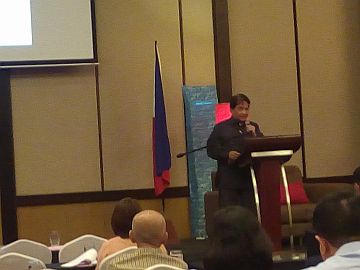
Dr. Cielito Habito addresses local banking stakeholders at a conference on competitiveness hosted by the Bangko Sentral ng Piilipinas.
CDN PHOTO/VICTOR SILVA
SUSTAINING EXPORT, FDI GROWTH
The government should make sure so-called “Dutertenomics” and the Philippine Development Plan 2017–2022 will be implemented the right way.
Dr. Cielito Habito, head of the USAID Trade-Related Assistance for Development (TRADE) project, said this as he reminded the Philippine government that despite the gains, the country still lags behind its peers in the Association of Southeast Asian Nations (Asean) in terms of exports and foreign direct investments.
Habito said much homework still needs to be done and that the Philippines has to work double time to catch up.
“‘Dutertenomics’ is on the right track as well as the Philippine Development Plan 2017–2022.
The government just has to make sure the implementation goes right,” Habito said during a conference on gearing up for external competitiveness hosted by the Bangko Sentral ng Pilipinas (BSP) in Cebu City on Tuesday.
“Dutertenomics” promises to usher in a so-called “golden age of infrastructure” as the government ramps up infrastructure spending to P8.4 trillion within Duterte’s six-year term.
Implementation
Even with the promising reforms proposed by the current administration to propel the growth of the country’s economy, he said it will still boil down to how these are implemented.
If the Duterte administration successfully carries out its reforms, everyone can look forward to greater growth in years to come.
However, he also cited some factors that do not have a place in “Dutertenomics” including restrictive rice trade policies that make the cost of rice here twice as much as that in Vietnam or Thailand; populist or captured tax measures; misguided labor market rules; extreme policy positions on assets; and uncoordinated policies rather than unity, solidarity and team work.
Exports, FDI
Habito, an economics professor at the Ateneo de Manila University, said that the Philippines may have increased its exports from an annual average of $27 billion to about $62 billion at present, but it still is the last among its Asean neighbors in terms of trade volume.
“We should not be sitting on our laurels so to speak,” he added.
On the part of Foreign Direct Investments (FDI), the country has multiplied its annual FDI from $1 billion a year to around $7.9 billion, but still lags behind.
He cited the remaining foreign investment restrictions in the country particularly the percentage that a foreign entity can own in a company here across various industries as the factor keeping the country from getting more FDIs.
Sweet spot
By 2050, he said working age Filipinos are expected to outnumber the dependent elderly and the very young, a trend identified as a demographic sweet spot in the Philippines.
However, 1 out of 3 Filipino children today suffer from stunting, impairing them from reaching their full physical and mental potential. On the other hand, another 7 percent are underweight.
Habito stressed the need to do away with the restrictions on rice trade policies to address this nutrition issue among Filipino children, who will eventually take over the workforce.
Bright prospects
Nonetheless, he also sees bright prospects for the Philippines as the national government implements its priorities for the country against the backdrop of Asean Economic Community 2025.
Among the key elements of this lineup of priorities are to aggressively pursue infrastructure projects, bring down remaining trade barriers, and move forward on services liberalization.
Habito also cited imperatives for inclusive development like coordinated promotion and support for micro, small and medium enterprises (MSME) through the revitalization of the MSME Development Council, wider competition and market contestability, fostering inclusive business and investing on young Filipinos.

